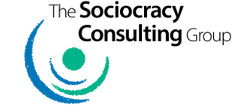Why we ask for objections to determine consent Confusing the means with the end The Sociocratic Circle-organization Method (SCM) defines consent as the absence of objections. Crucially, it also makes clear that objections are welcome and encouraged, because they provide valuable feedback regarding the proposal under consideration. Raising relevant objections is a beneficial behavior –…Continue reading
Author: John Schinnerer
What We Forget About Hierarchy
Unpacking Hierarchy What is a hierarchy? If our first thought is “an organizational structure that gives some people power over others,” we’re only partly right. The word “hierarchy” has become, in some human organizational contexts, a pejorative term that focuses exclusively on “power-over” types of hierarchies. And, this is only part of the meaning of…Continue reading
Regarding Objections
A common question we hear as people are learning consent decision-making goes something like this: “If we determine that an objection lacks sufficient reason, can we disregard it or not integrate into the proposal?” In other words – can we classify some objections as simply not worthy of attention? Without actually exploring their connection with…Continue reading
Zen and Sociocracy
The Zen school of Buddhism has a long history, and a great variety of disciplines and lineages. This post explores a few similarities between the wisdoms of Zen and sociocracy, based primarily on contemporary lineages of “engaged Buddhism.” Not Knowing Fundamental to most forms of Zen Buddhism is a commitment to penetrating the unknown –…Continue reading
“It’s Nothing Personal” – Elections and Objections
When we put someone in a role in a sociocratic organization, we use a transparent process of selection by consent. At the start, each circle member in turn nominates someone for the role. They give reasons why their nominee is well suited to the qualifications and responsibilities defined in the role description. Then each person…Continue reading
Motivation in Self-Managing Organizations – It’s Not About the Money
Dan Pink knows something about what motivates us. In this RSAnimate video he shares some surprising findings about what really moves us to perform better, to do our best, to stretch ourselves. His most general finding is that for all but purely mechanical tasks – that is, for anything that requires a bit of conceptual…Continue reading
Leadership Habits of Strategic Organizations
This Inc.com article on leaders as strategic thinkers, by Paul J. H. Schoemaker, offers a framework for illustrating how to build strategic leadership into self-managing organizations. The article suggests six habits of “Adaptive strategic leaders – the kind who thrive in today’s uncertain environment.” It describes how those habits support a successful organization. Schoemaker presents…Continue reading
How to Improve Employee Engagement
A November Gallup Poll finds that employee engagement – trending downwards in recent years – is still distressingly low. Consequences for companies in all sectors include increased employee turnover, with associated costs for hiring and training. What causes this – and more importantly, what can be done to address low employee engagement? In this press release, some…Continue reading
Learning Organizational Agility – From A School Success Story
Triple Pundit has just published the third of three articles by writer Sarah Lozanova on sociocracy (also called Dynamic Governance), a collaborative and highly effective organizational design and governance system for both for-profit companies and nonprofit organizations – “What Can a School Teach Us about Organizational Agility?” The article focuses on Rainbow Community School as…Continue reading
Engaged Employees – Dynamic Governance at Residential Care Home
Triple Pundit has just published the second of three articles by writer Sarah Lozanova on Dynamic Governance (Sociocracy), a high employee engagement approach for both for-profit companies and nonprofit organizations – “How This Residential Care Home Bumped Employee Engagement Into Overdrive.” The article focuses on Living Well Care Home and the Ethan Allen Residence as real-world…Continue reading





